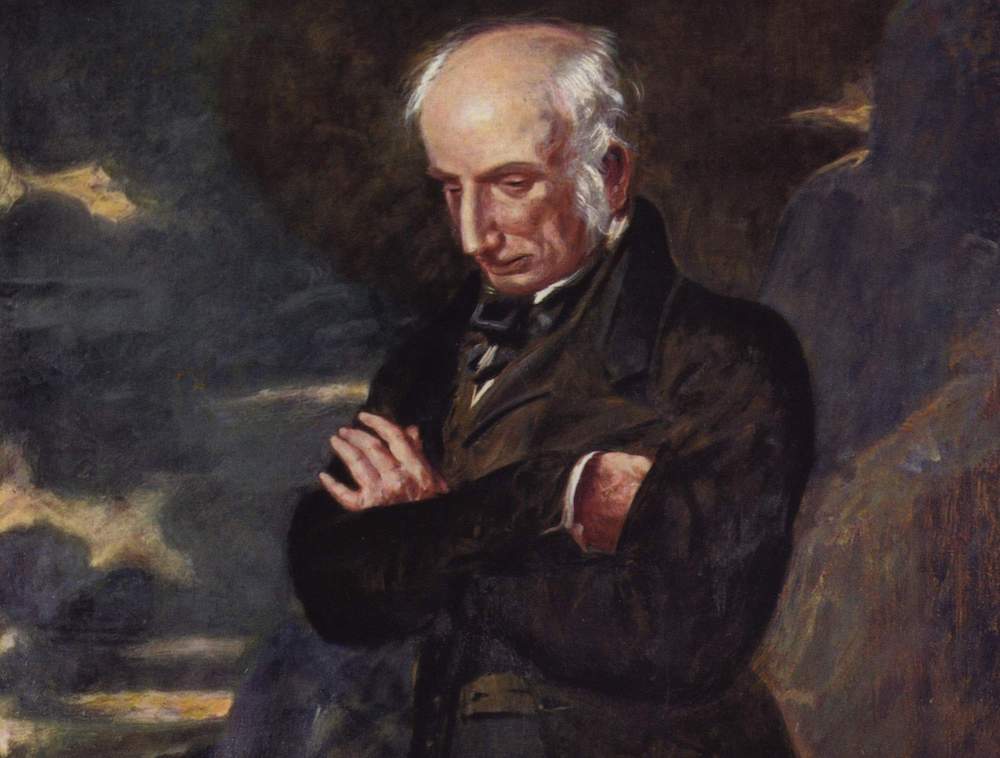Wordsworth’s Plain Speech

Good morning. Let’s start the week off with a little poetry. Like all great writers, William Wordsworth drew from the past to make something new, Algis Valiunas argues in First Things. Modern poetry sounds the way it does thanks in part to Wordsworth:
“‘I wandered lonely as a cloud.’ So begins a famous poem of William Wordsworth’s, one that was often taught to schoolchildren back when memorizing poetry was part of education. The poet comes upon ‘a crowd, / A host, of golden daffodils.’ The flowers flutter and dance before him, their petals like ‘stars that shine / And twinkle on the milky way.’ And when the poet retires to his couch and solitary reverie, his ‘heart with pleasure fills / And dances with the daffodils.’
“On its own, a little ditty like this does not earn a poet a formidable reputation. But with a body of poetic work about nature both gentle and fearsome, wandering beggars with ‘a spirit and pulse of good,’ stout-hearted leech-gatherers on the lonely moor, the “visionary gleam” of childhood perception that intimates the soul’s immortality, and the poet’s attempt to recover that elusive wonder, Wordsworth won an admiring readership in the early years of the nineteenth century. He was the greatest of the English Romantics, innovative in form and content, yet with a lasting influence on the conservative sensibility in culture and politics. Now he, along with Shakespeare and perhaps John Milton, belongs to the exclusive company of English poets whose names even the minimally educated are almost certain to have heard. Rightly so. Wordsworth perfected an artful use of plain, everyday speech, overturning the tradition of ornate diction in poetry.”
In other news: Michael Wilson tells the previously untold story of the patrolman who saved Martin Luther King, Jr. after he was stabbed in a Harlem department store: “What happened on Sept. 20, 1958, in a Harlem department store is briefly recounted in history books and old newspaper clippings that dutifully tell the who, what, when and where of a tragedy averted. But lesser known, because it was not in the nature of the men involved to broadcast it, are the snap decisions of a young officer and his partner, dropped into a scene of bedlam and confusion, that would change the course of American history.”
Ted Hughes and Seamus Heaney were longtime friends. They shared an interest in Ireland and fishing, among other things. Will Gompertz writes about recently discovered “letters, drawings and poems” between the two, which have been acquired by Pembroke College, Cambridge. (HT: A.M. Juster)
James E. Person Jr. reviews the final installment of Jonathan R. Eller’s three-volume life of Ray Bradbury: “Throughout his career, Bradbury demonstrated a mastery of writing stories of the supernatural and suspense, though he found himself pigeon-holed as a science fiction writer. He bristled at that designation, preferring to be considered a writer of fantasy and high imagination. But truth be told, he dreamed throughout his life of mankind traveling through space to other worlds, there to survive, to thrive, and somehow to overcome Adam’s curse of Original Sin.”
Alec Baldwin leaves WNYC for iHeartRadio: “When Baldwin invited his longtime friend Woody Allen onto his show, he says WNYC required him to ask Allen about long standing accusations by his daughter Dylan Farrow . . . ‘Once WNYC said, “We won’t air the interview unless you ask these questions” and forced that editorial content on me like that, I knew I was out of there.’ (The Allen episode aired in June and Baldwin says he asked some of WNYC’s questions after warning Allen in advance.)”
Matthew Yglesias leaves Vox for Substack: “Like Andrew Sullivan, who joined Substack after parting ways with New York magazine, and Glenn Greenwald, who joined Substack after resigning from The Intercept, which he co-founded, Yglesias felt that he could no longer speak his mind without riling his colleagues. His managers wanted him to maintain a ‘restrained, institutional, statesmanlike voice,’ he told me in a phone interview, in part because he was a co-founder of Vox. But as a relative moderate at the publication, he felt at times that it was important to challenge what he called the ‘dominant sensibility’ in the ‘young-college-graduate bubble’ that now sets the tone at many digital-media organizations.”
Where is Sandro Botticelli’s Madonna and Child (1485)? “The art work was last displayed in a 2007 exhibition at the New York gallery of Lawrence Salander. Once described as the Bernie Madoff of the art world, Salander fleeced fine art investors, including John McEnroe, and artists, notably the abstract expressionist Robert De Niro Sr, father of the actor, out of millions of dollars. After Salander was jailed in 2010, his creditors waged messy battles to prove they owned works he had stolen from them. One of the most notable of these was the Botticelli.”
Photos: Montana
Comments